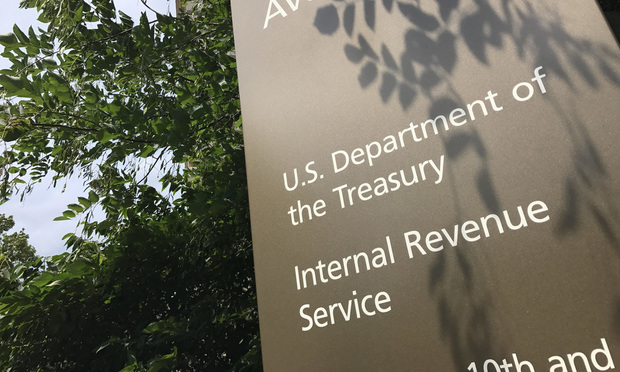How Tax Lawyers Are Advising Cannabis Clients
Generally, there are three paths lawyers might take in advising marijuana-industry clients squaring off with tax authorities. Here's a rundown.
August 27, 2018 at 06:15 PM
5 minute read
 IRS in Washington. (Photo: Mike Scarcella / ALM)
IRS in Washington. (Photo: Mike Scarcella / ALM)
Updated on Aug. 28 at 9:12 a.m.
With some form of marijuana now legal in 31 states and the District of Columbia, the nation may be marching toward the end of cannabis prohibition. The Internal Revenue Service, however, is moving to a very different legal beat.
Last month, the U.S. Circuit Court of Appeals for the Tenth Circuit upheld the federal tax agency's power to block state-legal marijuana operators from deducting certain business expenses from their taxes. The IRS derives its authority from Section 280E of the Internal Revenue Code, which bars companies from taking those deductions if they “traffic” in Schedule 1 drugs.
While California and other states may regulate licensed marijuana businesses, the IRS says the activity remains illegal for tax purposes. Without those deductions, state-legal operators can be hit with an effective total tax rate of 70 percent or more.
“I hear a lot of 'If we had only known,'” said Jennifer Benda, a tax attorney at Fox Rothschild in Denver. “Most of my [cannabis] clients are already teetering on the edge because of this.”
So how does an attorney counsel clients facing that kind of tax bill? Generally, there are three tacks, according to interviews with lawyers focusing on tax issues in the cannabis arena.
Challenge 280E in the courts.
Greenwood, Colorado-based Thorburn & Walker has made a niche practice of challenging 280E and the IRS interpretation of its provisions. In the case Alpenglow Botanicals v. United States of America, James Thorburn and Richard Walker sued the federal government on behalf of two Colorado dispensary owners smacked with a combined $53,000 bill from the IRS for allegedly taking improper tax deductions.
A Tenth Circuit panel sided with the IRS. Thorburn and Walker have asked the full court to reconsider that ruling. The attorneys have declined to comment on the case, but they have alleged in the past that the federal government is using tax laws—instead of criminal prosecutions—to crack down on state-legal marijuana operations. In Alpenglow, they argue, the court gave the IRS too much prosecutorial power.
➤➤ Get the latest cannabis lawyering, compliance and commentary straight to your inbox with Higher Law, a new Law.com briefing. Learn more and sign up here.
“The court's decision has now opened the door to criminal convictions of drug law crimes via administrative order,” Thorburn and Walker wrote in petitioning the Tenth Circuit for review. “For the sake of our Constitution, this is not a door that should be opened.”
Other lawyers are resigned to the likelihood that courts are unlikely to curb IRS power. “A court is not going to say that 280E does not apply to these businesses,” said Benda.
James Hunt, an attorney at Harris Bricken in Seattle, said he's “never advised clients to not apply 280E” to their tax returns. “A lot of this comes down to the statute says what it says, and there's no doubt that is a very harsh statute.” Hunt said. “It's unfair.”
Fight to change another section of tax law.
Another potential area of tax law ripe for challenge, Benda said, is Section 263A of the Internal Revenue Code. The statute could allow marijuana businesses to calculate their inventory costs in a way that would help lower their tax bills—if they could use the provision. The IRS office of chief counsel said in a 2015 memo that 263A was not meant to make non-deductible expenses deductible.
“What I tell these [tax] agents is, if I wasn't a marijuana business you would let me put this into costs of goods sold,” Benda said.
Benda said that singling out cannabis companies from inclusion in this provision is a weak legal argument, and while it hasn't been challenged yet, “it will be soon.”
Just deal with it and wait for Congress to act.
Marijuana businesses can factor in the heavy tax load that comes with federal laws and still survive, but “it's very, very hard,” said Hunt of Harris Bricken.
Marijuana tax law “is clearly punishment. It's meant as a punishment” to the industry, he said.
Some things can be done to lower tax bills, Benda said.Packaging done where marijuana is cultivated is generally accepted as includible in a cost of goods sold but packaging done at a retailer's site can present issues, she said.
“You have to minimize your retail costs,” Benda said. “That's how you minimize your 280E costs.”
Congressional allies of the regulated marijuana industry have introduced legislation that would allow cannabis operators to take the same tax deductions enjoyed by other companies. Those bills and others favorable to state-legal businesses have stalled amid opposition from key congressional leaders.
Read more:
New Cannabis Industry Suit Alleges Fraudulent Business Practices
Why Patent Lawyers Are Watching This Colorado Cannabis Case
US Appeals Court Urged to Curb IRS Sway Over Cannabis Industry
This content has been archived. It is available through our partners, LexisNexis® and Bloomberg Law.
To view this content, please continue to their sites.
Not a Lexis Subscriber?
Subscribe Now
Not a Bloomberg Law Subscriber?
Subscribe Now
NOT FOR REPRINT
© 2025 ALM Global, LLC, All Rights Reserved. Request academic re-use from www.copyright.com. All other uses, submit a request to [email protected]. For more information visit Asset & Logo Licensing.
You Might Like
View All
Lost in the Legal Maze: How State Regulations Are Hindering Hemp Operators' Success
7 minute read
California Appeals Court Rejects Marijuana Grow Permit, Citing Federal Illegality
4 minute read
Trending Stories
- 1Critical Mass With Law.com's Amanda Bronstad: 700+ Residents Near Ohio Derailment File New Suit, Is the FAA to Blame For Last Month's Air Disasters?
- 2Law Journal Column on Marital Residence Sales in Pending Divorces Puts 'Misplaced' Reliance on Two Cases
- 3A Message to the Community: Meeting the Moment in 2025
- 4Ex-Prosecutor Denies on Witness Stand That She Tried to Protect Ahmaud Arbery's Killers
- 5Latham's Lateral Hiring Picks Up Steam, With Firm Adding Simpson Practice Head, Private Equity GC
Who Got The Work
J. Brugh Lower of Gibbons has entered an appearance for industrial equipment supplier Devco Corporation in a pending trademark infringement lawsuit. The suit, accusing the defendant of selling knock-off Graco products, was filed Dec. 18 in New Jersey District Court by Rivkin Radler on behalf of Graco Inc. and Graco Minnesota. The case, assigned to U.S. District Judge Zahid N. Quraishi, is 3:24-cv-11294, Graco Inc. et al v. Devco Corporation.
Who Got The Work
Rebecca Maller-Stein and Kent A. Yalowitz of Arnold & Porter Kaye Scholer have entered their appearances for Hanaco Venture Capital and its executives, Lior Prosor and David Frankel, in a pending securities lawsuit. The action, filed on Dec. 24 in New York Southern District Court by Zell, Aron & Co. on behalf of Goldeneye Advisors, accuses the defendants of negligently and fraudulently managing the plaintiff's $1 million investment. The case, assigned to U.S. District Judge Vernon S. Broderick, is 1:24-cv-09918, Goldeneye Advisors, LLC v. Hanaco Venture Capital, Ltd. et al.
Who Got The Work
Attorneys from A&O Shearman has stepped in as defense counsel for Toronto-Dominion Bank and other defendants in a pending securities class action. The suit, filed Dec. 11 in New York Southern District Court by Bleichmar Fonti & Auld, accuses the defendants of concealing the bank's 'pervasive' deficiencies in regards to its compliance with the Bank Secrecy Act and the quality of its anti-money laundering controls. The case, assigned to U.S. District Judge Arun Subramanian, is 1:24-cv-09445, Gonzalez v. The Toronto-Dominion Bank et al.
Who Got The Work
Crown Castle International, a Pennsylvania company providing shared communications infrastructure, has turned to Luke D. Wolf of Gordon Rees Scully Mansukhani to fend off a pending breach-of-contract lawsuit. The court action, filed Nov. 25 in Michigan Eastern District Court by Hooper Hathaway PC on behalf of The Town Residences LLC, accuses Crown Castle of failing to transfer approximately $30,000 in utility payments from T-Mobile in breach of a roof-top lease and assignment agreement. The case, assigned to U.S. District Judge Susan K. Declercq, is 2:24-cv-13131, The Town Residences LLC v. T-Mobile US, Inc. et al.
Who Got The Work
Wilfred P. Coronato and Daniel M. Schwartz of McCarter & English have stepped in as defense counsel to Electrolux Home Products Inc. in a pending product liability lawsuit. The court action, filed Nov. 26 in New York Eastern District Court by Poulos Lopiccolo PC and Nagel Rice LLP on behalf of David Stern, alleges that the defendant's refrigerators’ drawers and shelving repeatedly break and fall apart within months after purchase. The case, assigned to U.S. District Judge Joan M. Azrack, is 2:24-cv-08204, Stern v. Electrolux Home Products, Inc.
Featured Firms
Law Offices of Gary Martin Hays & Associates, P.C.
(470) 294-1674
Law Offices of Mark E. Salomone
(857) 444-6468
Smith & Hassler
(713) 739-1250







